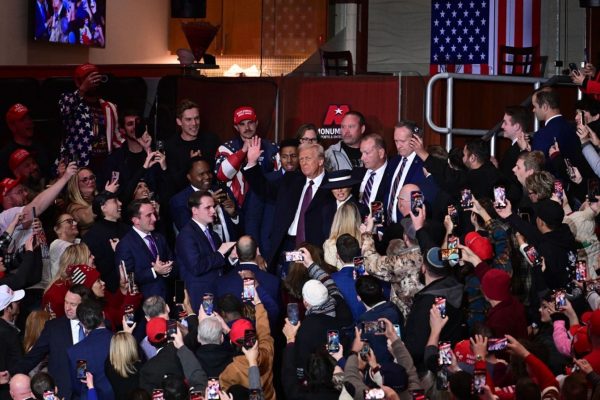Roe V. Wade? More Like the People V. the Court
Every headline is overtaken by one thing right now: the leaked draft opinion from the Supreme Court of the United States about overturning Roe v. Wade.
For those who do not know what Roe v. Wade is, it was a Supreme court case that, in 1973, led to the ruling that the right to abortion—the termination of a pregnancy—was protected under the Constitution.
The controversy of this comes from wether or not terminating a pregnancy is murder. (def: the unlawful killing of one human being by another)
The Fourteenth Amendment, the fundamental right to privacy, was the basis for the ruling protecting a woman’s right to this medical procedure. Additionally, there is a list of reasons why people fight for freedom to get this procedure.
However, the basis of the ruling is that it does not matter the reasoning why one may want one (hence the privacy part!)
What is a draft opinion?
A draft opinion is just what is sounds like, an opinion still in the works. It gets circulated between Justices who support this opinion, and they edit it.
The public release of a draft opinion has never happened before, mainly because it is obviously not final. For there to be a leak of such an opinion is extremely rare.
There could still be substantial changes to the reasoning/wording within it, and Justices could change their minds. The only value that the release of the draft opinion holds is that it shows how the court is most likely to rule on behalf of this issue
Who Is on The Supreme Court Right Now, And Why It Matters
There are nine Justices who sit on this court. And while this court is not supposed to be political, often there may be occasions where it does become so, as Justices are appointed by the President and approved by the Senate.
If the Senate is majority republican, and the president is a Democrat who appoints someone who has more left leaning views, the Senate could very likely refuse to accept the candidate.
This is what we saw with Obama’s appointment, Merrick Garland, who was blocked by the majority Republican Senate. For a year.
The actions of the 114th senate was perfectly summed up by NYU Law Review as “Republicans deliberately seeking to transfer President Obama’s power to appoint Justice Scalia’s replacement to the next elected president.” Once again politicizing the court by delaying the appointment in hopes of a Republican President to come in and appoint a right-leaning Justice.
The Justices don’t represent political parties, but the media characterizes six as more right-wing/conservative, and three as more left-wing/liberal.
Three Justices, all characterized as right-wing, were all appointed by Donald Trump. The fact a third of the court was appointed by one president—who did not even win the popular vote–is very problematic to many. He also vowed during his political campaign that he would put pro-life Justices on the court.
Regardless of the courts purpose and civic duty, it is obvious that appointments and confirmations have their political influences.
After the Senate hearings for the three Justices Trump appointed, we now know that they were untruthful about how they would treat Roe v Wade, saying that they would not work to overturn the case. This leak of the draft opinion has exposed their lies. With that, the court is losing trust and support from the people, the absolute last thing they would want.
Politics on the Apolitical Court: Why it’s an Issue
The Founding Fathers gave Justices and other federal judges a lifetime appointment to prevent them from being influenced by other branches of the government.
But as we can see, politics bare heavy weights on the SCOTUS. Pew Research Center found that 84% of adults that say Justices should not bring their political views into court cases are probably questioning the efficacy and reliability it holds.
So, I guess the question is: should Justices continue to have lifetime appointments if the court has already become extremely political?
Why This Whole Situation is Unusual
The Roe v. Wade ruling is over fifty years old. But regardless of its age, in a common law system—what this country has—it is extremely unusual to overturn any precedent (def: an earlier event or action that is regarded as an example or guide to be considered in subsequent similar circumstances.)
Since 1810, there has only been 232 cases overturned by the US supreme court. And most precedents that have been overturned have been steps forward for this country to have “liberty and justice for all.”
Many are saying that reversing Roe v. Wade would be a step backward for this country, hence the uniqueness of this ruling.
Public Opinion
In a Politico poll, over half of voters say that they are not in support of the court potentially overturning Roe v Wade. The break down is 68% of Democrats, 52% of Independents, and 51% of Republicans.
Does this mean that the Justices on the court are not supporting the majority of the people, if overturned? And although they are not elected by the people, citizens are inherently frustrated for reasons stated before, but here is the breakdown of them:
1. The three Justices being appointed by the same president who campaigned on pro-life opinions.
2. The court is not an accurate representation of the people in this country due to many radical views.
3. The Justices who were not truthful in their senate hearings.
4. Religious views being prominent in arguments for abortion/people’s viewpoints on how the case should be ruled originating from their religious beliefs (regardless of seperation of church and state.)
5. The argument of abortion stripping away a woman’s autonomy and her right to choose what to do with her body, as well as ones right to privacy.
The protests and movements that have strengthened in response to this show that no one is going down without a fight. (Verbal, not physical!)
What Happens if This Opinion Becomes the Final Ruling
Abortion wouldn’t become immediately illegal in every state if it becomes the final ruling. However, every state could now make it illegal as the right to abortion would no longer be protected by the Constitution.
13 states already have “trigger laws” to immediately make abortion illegal if this precedent in passed.
President Biden has responded to this leak by emphasizing his administration’s disapproval for an overturning. He said that if they do make this ruling, “it will fall on our nation’s elected officials at all levels of government to protect a woman’s right to choose.” He also stated that “it will fall upon voters to elect pro-choice officials this November.” (CNBC)
What to Expect in Upcoming Months
We should expect to see many candidates campaigning for the primaries voicing their opinions on Roe V Wade a lot more then we have seen in the past few decades. Both candidates that’re in opposition to the precedent and in favor of it will most likely be relying on votes to come from what they say their intentions are with the case.
Wether the court will make this draft opinion official is to be determined.
Hopefully, we will hear more directly from the SCOTUS soon.
Click here to read some key passages from the draft opinion leak.




Eydis Needleman • May 13, 2022 at 7:11 pm
This story was well written and informative.
Eydie Needleman • May 13, 2022 at 7:00 pm
Very well written and informative.